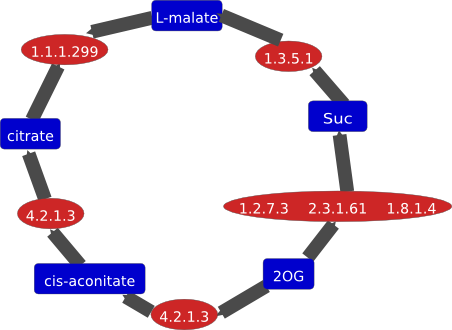EC Number   |
Substrates   |
Organism   |
Products   |
Reversibility   |
|---|
    1.17.1.8 1.17.1.8 | 2,3-dihydrodipicolinate + NAD(P)H |
- |
Mycobacterium tuberculosis H37Rv |
2,3,4,5-tetrahydrodipicolinate + NAD(P)+ |
- |
? |
    1.17.1.8 1.17.1.8 | 2,3-dihydrodipicolinate + NAD(P)H |
second step in the biosynthesis of meso-diaminopimelate, a bacterial cell wall component, and is involved in L-lysine biosynthesis |
Mycobacterium tuberculosis H37Rv |
2,3,4,5-tetrahydrodipicolinate + NAD(P)+ |
- |
? |
    1.17.1.8 1.17.1.8 | 2,3-dihydrodipicolinate + NAD(P)H |
- |
Bacillus subtilis PCI 219 |
2,3,4,5-tetrahydrodipicolinate + NAD(P)+ |
- |
? |
    1.17.1.8 1.17.1.8 | 2,3-dihydrodipicolinate + NAD(P)H |
- |
Thermotoga maritima MSB8 / DSM 3109 / ATCC 43589 |
2,3,4,5-tetrahydrodipicolinate + NAD(P)+ |
- |
? |
    1.17.1.8 1.17.1.8 | 2,3-dihydrodipicolinate + reduced 3-acetylpyridine adenine dinucleotide |
- |
Escherichia coli |
2,3,4,5-tetrahydrodipicolinate + oxidized 3-acetylpyridine adenine dinucleotide |
- |
? |
    1.17.1.8 1.17.1.8 | dihydrodipicolinate + NADH + H+ |
substrate dihydrodipicolinate is instable |
Escherichia coli |
tetrahydrodipicolinate + NAD+ |
- |
? |
    1.17.1.8 1.17.1.8 | more |
DHDPR accepts (4S)-4-hydroxy-2,3,4,5-tetrahydro-(2S)-dipicolinic acid as true substrate rather than dihydrodipicolinate, suggesting that DHDPR catalyzes an overall deoxygenation reaction, likely by a dehydratase-reductase route, substrate specificity, overview. A critical role is played by residue His 159 in the catalytic mechanism of DHDPR. Replacement of this residue with an alanine or a glutamine is reported to result in a 150-200fold reduction in catalytic rate as well as a 6fold increase in KM. His 159 has been proposed to act as a general acid during catalysis, providing the proton required after hydride addition. No activity with beta-hydroxypyruvate and 3-fluoropyruvate |
Escherichia coli |
? |
- |
? |
    1.17.1.8 1.17.1.8 | pyridine dicarboxylate + NADH + H+ |
stable substrate analog, 25 mM phosphate D2O (deuterium water) buffer, pH 7.8 for NMR analysis of binding interactions with saturation transfer difference titration studies at 298 K (25°C) |
Escherichia coli |
reduced pyridine dicarboxylate + NAD+ |
- |
? |
    1.17.1.8 1.17.1.8 | (2S,4S)-4-hydroxy-2,3,4,5-tetrahydrodipicolinate + NADH + H+ |
- |
Staphylococcus aureus |
(S)-2,3,4,5-tetrahydropyridine-2,6-dicarboxylate + NAD+ + H2O |
- |
ir |
    1.17.1.8 1.17.1.8 | (2S,4S)-4-hydroxy-2,3,4,5-tetrahydrodipicolinate + NADH + H+ |
- |
Pseudomonas aeruginosa |
(S)-2,3,4,5-tetrahydropyridine-2,6-dicarboxylate + NAD+ + H2O |
- |
ir |





